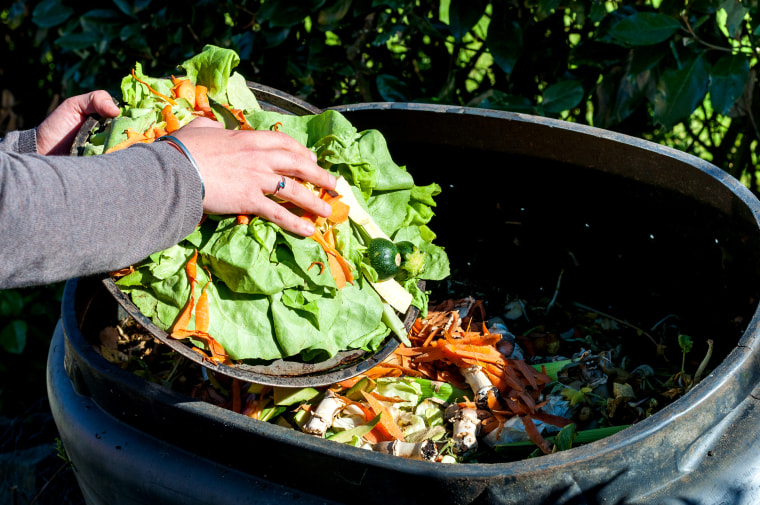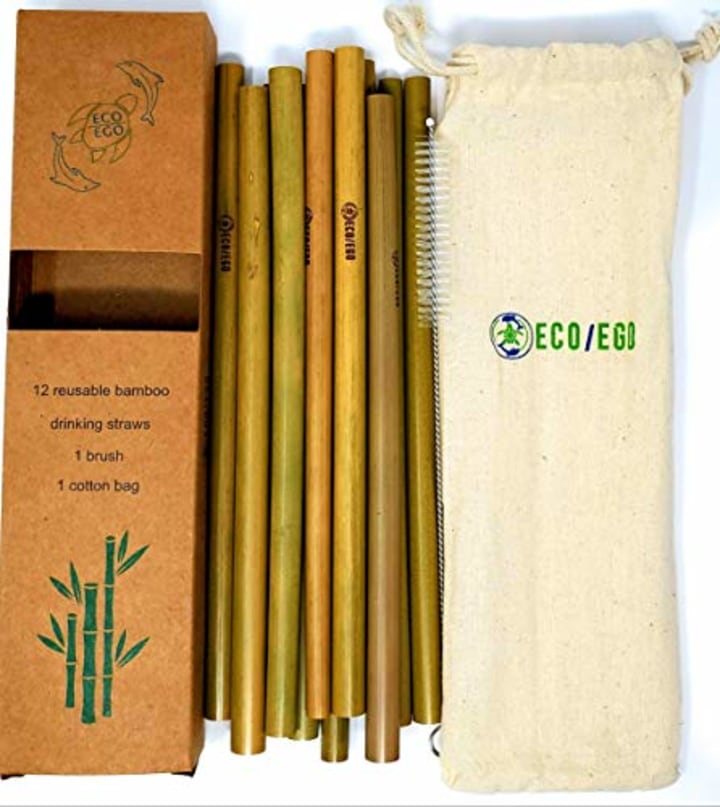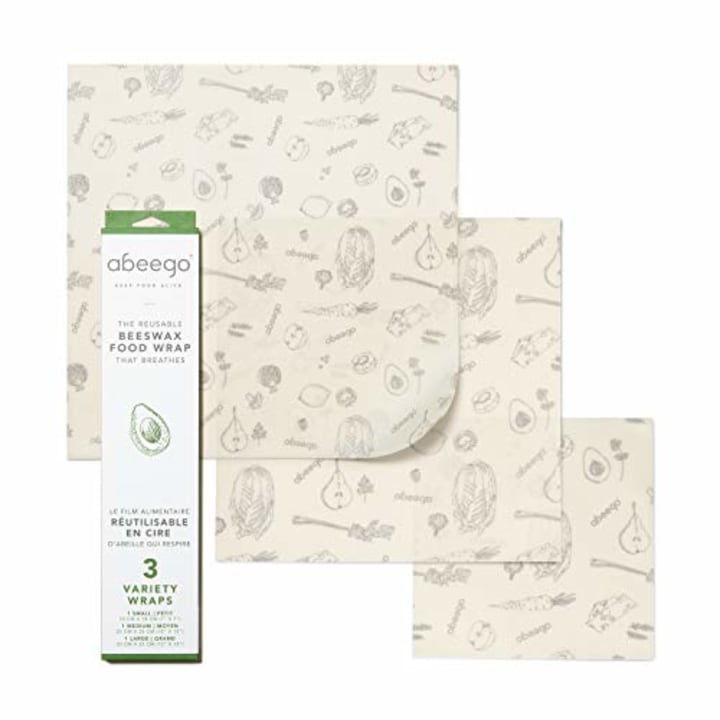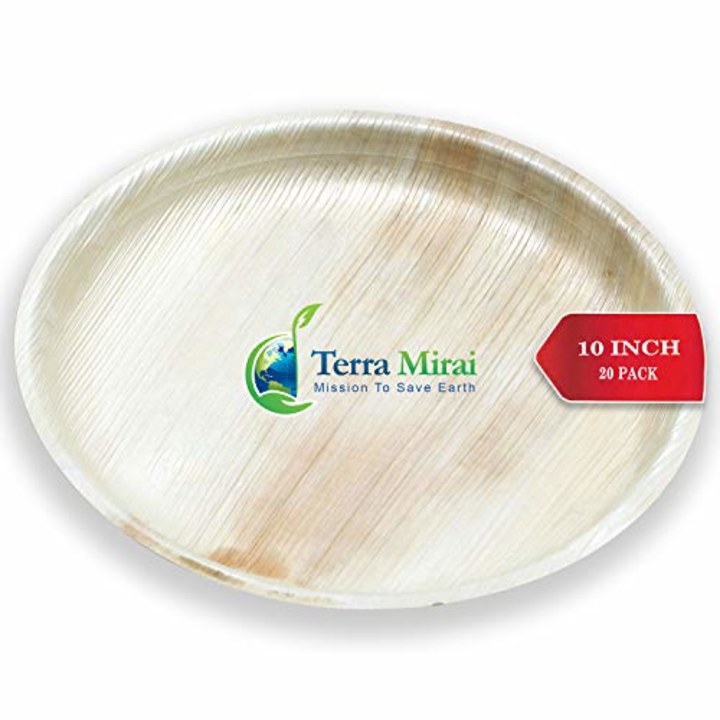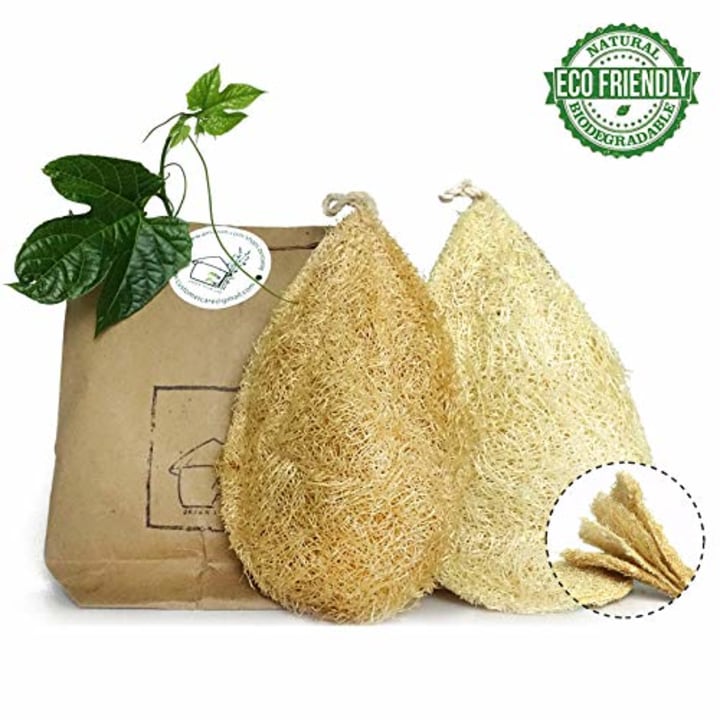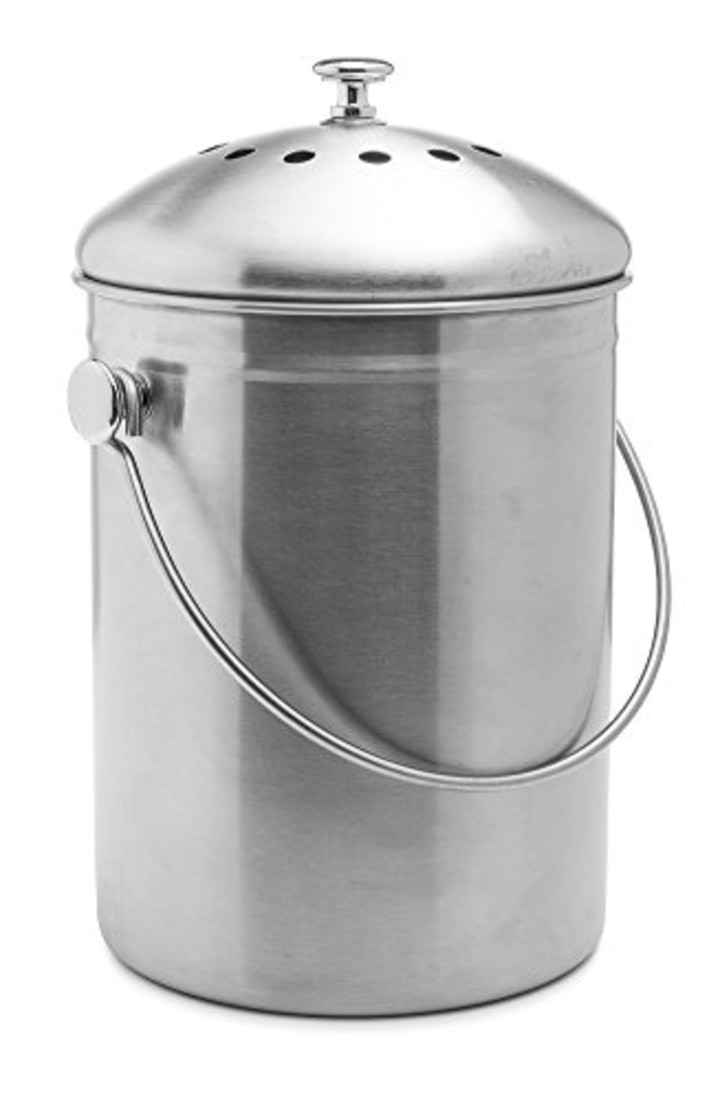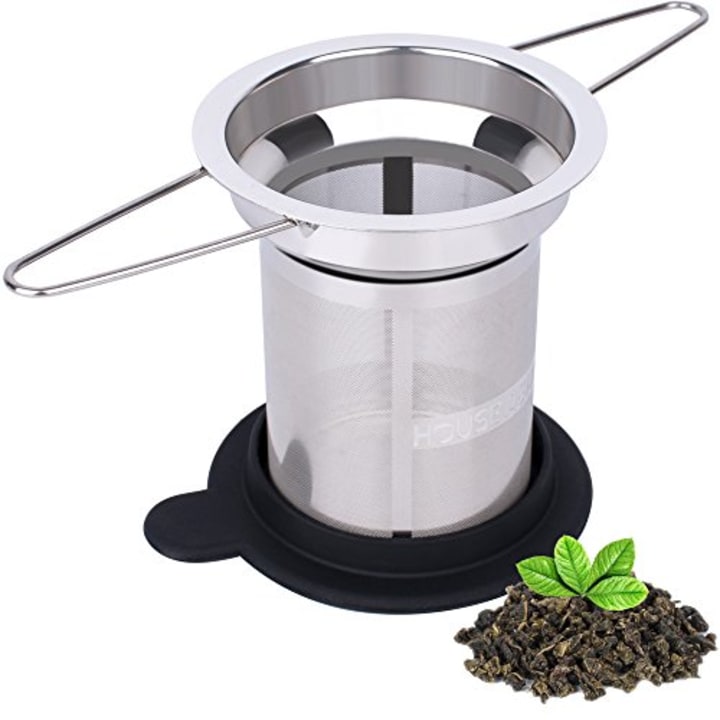On April 22, 1970, 20 million Americans demanded a new approach to the way the United States faced climate change — noting that environmental ignorance was a global issue. Thanks to the unified response, Earth Day was officially established.
Wednesday marks the 50th Anniversary of Earth Day and people will once again demand mass climate action. Though you can't take to the streets to march or rally due to social distancing guidelines and stay-at-home orders, you can do your part by implementing environmental change from your own home.
Learn more about the impact of climate change along with the small steps you can take to be more eco-friendly — starting with your kitchen.
Full coverage of the coronavirus outbreak
In this article
- Invest in reusable straws
- Choose beeswax wrap over plastic cling wrap
- Buy palm leaf plates instead of paper plates
- Use biodegradable dish brushes instead of plastic ones
- Do not use non-sustainable palm oil
- Recycle your cooking oil
- Compost food scraps
- Make your own tea with a tea infuser
- Eat plant-based as often as possible
Why is climate change an important topic?
Scientific research proving the existence and lethal threats of global warming are nothing new, but the message, or alarm bells, are louder and clearer than ever. A comprehensive report from the U.N. released last month found that — given the ocean is absorbing greenhouse gas-created heat in the Earth — the ocean's heat content "reached record-high levels again in 2019."
Humans have reached a watershed moment in their history, and the waters are rising fast, literally. We’ve already seen significant evidence of the toll of climate change, from not-so-natural natural disasters to devastating droughts and abnormal heat waves, not to mention the extreme endangerment of wildlife among other dismal events.
It’s difficult to be realistic without getting caught up in the doom and gloom of it all, but scientists like Peter Fiekowsky, a MIT-trained physicist and the founder of the Foundation for Climate Restoration (F4CR), reasons that now is the time for a positive mindset.
“There is good reason for optimism and it starts with people talking about climate change and saying, ‘What can I do?’” Fiekowsky tells NBC News BETTER. “The survival and flourishing of humanity is our responsibility and it is doable.”
Much of what is required to combat climate change feels bigger than us, but we can all take simple and practical measures to benefit the planet (or at least, stop piling on the damage). Consumers appear to be ready and willing to make the necessary adjustments, with a report from Pinterest finding that searches for “sustainable” are up 108 percent, and searches for “save the planet” are up 380 percent.
What can you do on Earth Day 2020?
Join the Earth Day Network to help make a difference on Earth Day and beyond. On Wednesday, April 22, the organization challenges you to visit earthday.org to engage in live-streamed discussions, learn about call-to-action initiatives and how you can use social media to spark conversation about climate change. In addition, you can take small steps inside your home to minimize the impact of consumer products on the environment. Here's how you can help by swapping out and adding kitchen products to your home.
Invest in reusable straws
Every year, more than 8 million metric tons of plastic go into the ocean, as noted by the Ocean Conservancy. This is in addition to the estimated 150 million metric tons that are already circulating in marine environments. Cutting down on plastic straws alone surely isn’t going to be enough in terms of saving our oceans and their wildlife, but if one less contaminant ends up in the sea, that’s a good thing.
Mutnitt Stainless Steel Straws
“Metal straws are an ultra convenient way to practice sustainable living,” says Brandon Leibel, co-founder of Sand Cloud, a socially conscious lifestyle brand on a mission to #SaveTheFishies. “If you carry one with you, you won't have to use single-use plastic straws at restaurants or coffee shops.”
ECO/EGO Reusable Organic Bamboo Straws (in stock on April 23)
Pinterest found that searches for sustainable products are up 89 percent, and among the top-shopped products in this category were bamboo straws. A set of 12 (with a cleaning brush and travel case) goes for $8.99 on Amazon.
Choose beeswax wrap over plastic cling wrap
Another easy way to cut back on plastic: beeswax wrap. This is an eco-friendly alternative to plastic wrap and plasticware. This reusable excess byproduct of honey production is great for wrapping foods as its durable, non-toxic and has a low melting point.
Abeego, The Original Beeswax Food Storage Wrap
“I love using beeswax wraps,” says Ferwa Chevel Khalfan, founder of Aristos, a lifestyle platform. “These are insanely useful and hold up really nicely. Abeego are the best from the few that I’ve tried out. I haven’t bought a roll of cling wrap in over a year.”
Buy palm leaf plates instead of a paper plates
Hosting a party and don’t want to waste water on doing the dishes after? Traditionally, you’d go for a stack of paper or styrofoam plates that would surely end up in a landfill after use. Instead, go for another Pinterest top-shopped sustainable product: palm leaf plates.
Terra Mirai Areca Palm Leaf Plates (limited availability)
These are an eco-friendly option because no trees were harmed to make them (they’re made from fallen palm leaves) and they’re biodegradable.
Use biodegradable dish brushes instead of plastic ones
Also on Pinterest’s top-10 most shopped sustainable products is biodegradable dish scrubbing brushes.
Miw Piw Natural Dish Scrubber
These are plastic-free and made from plants. They aren’t as cheap as regular dish sponges, but you can make them last a lot longer by cleaning them (I simply boil them in water with a splash of white vinegar).
Do not use non-sustainable palm oil
As a thorough report from the Union of Concerned Scientists explains, palm oil plantations are contributing substantially to the release of carbon dioxide (CO2), the gas that is the leading cause of global warming. Palm oil production is also a key player in deforestation (which accounts for 10 percent of global warming emissions) and are pushing animals such as orangutans into mass extinction.
Palm oil is a super versatile oil that unfortunately, is an ingredient in countless consumer staples — from dish soaps and lipsticks to chocolate and margarine. You don’t need to boycott palm oil altogether, just do a little bit of homework when buying it. The WWF issues reports on which companies and brands are following the guidelines for the sustainable use of palm oil.
Recycle your cooking oil
“It's important to be aware of alternate destinations for used food or cooking byproduct besides the landfill,” says Matthew Hollis, founder of Elytus, a waste management service firm. “For example, cooking oil can be recycled rather than poured down the drain, which can cause a blockage. Simply collect it in a grease-safe container and look online for local recycling resources in your area. Recycling cooking oil can be turned into something else, such as biodiesel to give new life and be useful.”
Compost food scraps
Food scraps don’t have to end up in a landfill either. We previously covered simple ways you can use foods that would otherwise be headed for the trashcan, but if that doesn’t work out, try composting to “create a nutrient-rich additive for your garden,” says Hollis.
"Diverting food waste away from the landfill prevents greenhouse gases from being released,” Hollis explains. “Reducing food waste also helps conserve the energy and resources that go into growing crops, manufacturing, transporting, and selling food. Small changes in the kitchen can create ripple effects of positive change throughout the food ecosystem."
Epica Stainless Steel Compost Bin
Purchase a compost bin, which can be stored in a shaded corner of your yard. You can also store your plant-based food waste in a sealed container in your freezer and then drop it off at a local farmers market for composting.
Make your own tea with a tea infuser
Kayla Clements, an entrepreneur and the author of “Daytripper: 60 Days on the Road Exploring America's National Park” has stopped buying tea bags and instead buys herbs in bulk (you could also grow your own on your windowsill). She then stores them in mason jars and uses a stainless steel tea filter to prepare.
House Again Extra Fine Mesh Tea Infuser
“You can compost the leaves when you're finished drinking, rinse out the filter, and voila, no waste,” says Clements. “For someone who drinks around 4-6 cups of tea a day, this impact adds up quickly. My current favorite tea blend is peppermint leaf, nettle leaf, and raspberry leaf.”
Eat plant-based as often as possible
Meat and dairy is a staple ingredient in so many diets, but we have good reason to opt for veganism at least once a week. Johnathan Foley, executive director of Project Drawdown, a coalition of researchers and scientists who are working on climate change solutions, told NBC News BETTER in August that about 25 percent of climate change today is fueled by agriculture and factory farming. An IPCC report found that by embracing a more plant-based diet, we could reduce the equivalent of up to 8 gigatons of carbon dioxide per year. Here are some tips on how to eat for a better planet.
MORE FROM BETTER
- How to buy refurbished tech at Amazon, Walmart, Apple and more
- How to wash your hands properly, according to doctors
- Sous vide guide: How it works and best recipes to get started
- 8 simple ways to reduce your plastic use
